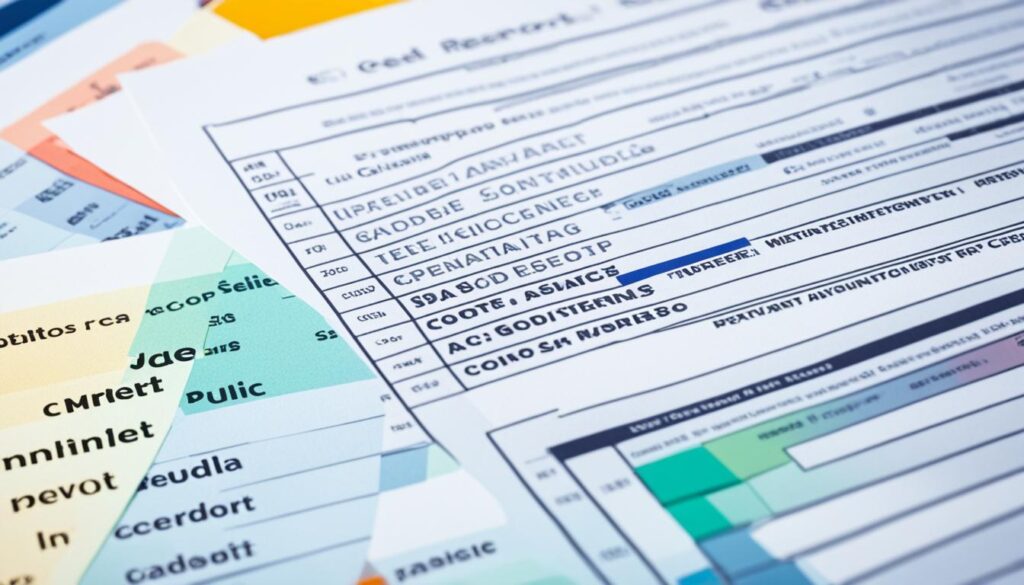An Experian credit report shows your whole credit history in different ways. It has important info for your money health, like accounts and public records.
Things like late payments or accounts sent to collections stand out. These items show lenders you might miss payments or default.
It’s key to look at your report closely and learn about credit. Doing this helps you make your financial health better.
What is a Credit Report?
A credit report is a key document that shows your credit history. It affects your credit score and decisions by lenders. Knowing the credit factors helps make better spending and borrowing decisions. This can improve your financial health.
Experian, Equifax, and TransUnion are the big three credit agencies. They make credit reports. Scores go from 300 to 850. A score of 850 is the best.
The most important part of your score is your payment history. It shows if you pay back debts on time. Learn more about credit score factors here.
Your credit score comes from your credit report. Late payments and collections can stay on the report for seven years. Bankruptcies can stay for ten years. This shows how long they can affect your financial reputation.
It’s key to make sure your credit report is right. Mistakes can mess up your financial picture. The Fair Credit Reporting Act says any errors must be fixed within 30 days. This keeps your report accurate.
Personal Information on Your Credit Report
Keeping your personal information correct on your credit report is key. This part includes things like names, places you live, Social Security Numbers, and how to contact you. People, companies that lend money, or other sources add this info so they know who you are.
Checking your report often is important. It helps make sure your info is right and there are no mistakes.
- Name Variations: Make sure all ways your name is written are right and spelled correctly.
- Address History: Check that all your addresses are correct. Take off any old ones you don’t need.
- Social Security Number: Be sure your Social Security Number is right.
- Contact Information: Check that your phone number and email are current.
Doing these things as part of learning about credit can stop mix-ups. It keeps your money matters safe.

Accounts: Key Component of Your Credit Report
Accounts show how you handle money and debt. They include credit cards and loans reported by lenders. Looking at these accounts helps check your credit history is right.
Accounts can be in good shape or have problems. They show your balances, payments, and how much you can borrow. It’s key to make sure these details are correct to keep a good financial record. Wrong reports by lenders can lead to mistakes.
It’s smart to keep an eye on your financial status. This makes sure your info is correct. It helps avoid errors on your credit report.
- Monthly balances reported by creditors
- Payment history on each account
- Credit limits for revolving accounts
- Terms of agreements for installment loans
Making sure your account details are right prevents problems. Check your accounts often. This helps fix mistakes fast. It keeps your credit score healthy.
Understanding Collections in Your Credit Report
When an account is past due, it may be reported as a collection on your credit report. This can affect your financial report for up to seven years. It’s important to check these reports for accuracy.
Collection accounts can include both unsecured and secured debts. For example, if a car is repossessed and sold for less than what was owed, it can affect your report. Debt collectors may try to get the money directly or through the original lender.
Federal laws protect you from unfair debt collection practices. No one can threaten you with jail over debts. For more information, read about removing collections from a credit report. Knowing these details helps you manage your credit health.
Always check your credit report for wrong collection entries. This can help protect your credit score. Keeping an eye on your report helps you understand important factors that affect your credit.
Public Records and Their Influence on Your Credit Report
Public records really shape your credit report. Bankruptcy records show if someone can’t pay their bills. Both Chapter 7 and Chapter 13 bankruptcies affect your report for years. They change how lenders see you.

To understand their effect on your credit report, know that lenders pay attention. A bankruptcy signals risk to them. This is why it’s key to check the records for mistakes. Keeping your credit report true is very important.
It’s crucial to check your records often. This keeps your financial insights accurate. Taking care of your records helps your money health.
Credit Inquiries and Their Significance
Understanding the impact of credit inquiries is vital for good credit health. There are two kinds: hard and soft. Hard inquiries can hurt your credit score. They stay on your report for two years. This type happens when you apply for new credit, like for a loan or credit card.
A lot of hard inquiries quickly can look bad to lenders. It suggests you might need a lot of credit. On the other hand, soft inquiries won’t hurt your score. They can happen for many reasons. For example, checking your own credit or getting pre-approvals.
Soft inquiries may be on your report but don’t lower your score. This lets you check your credit health safely. It’s smart to look out for hard inquiries you didn’t okay. They could mean identity theft or harm your score.
You can get a free credit report yearly from Experian, TransUnion, and Equifax. Checking that all hard inquiries were okayed is important for your credit education. It keeps your finances safe. Sometimes, credit repair companies can remove wrong hard inquiries faster than two years.
In short, know the difference between hard and soft inquiries. Check your credit report often. Doing so helps keep your credit health strong. It also guides your financial choices wisely.
The Role of Medical Information in Your Credit Report
Medical debts can show up in your credit report. But, privacy laws protect your detailed medical info. Instead, these debts show as “medical payment data” by collectors. This is key since mishandled medical debts can hurt your credit scores.
It’s vital to do a deep credit report analysis often. By checking your credit report regularly, you can make sure it’s all correct. This includes medical debts. Full checks help keep your financial health clear, making sure medical debts are right. This stops any mistakes that could damage your credit.
Knowing how medical debt reporting works is important. Even small mistakes can mean big problems. So, keeping an eye on any medical debts in your report is a must. Doing this helps keep your credit score up. It also keeps your credit report looking good for lenders.
Disputing Information and Knowing Your Rights
Consumers can fight mistakes in their credit reports. The Fair Credit Reporting Act (FCRA) sets rules for credit bureaus. These rules help keep credit information correct and fair. It’s key to know and use your credit rights to stay financially healthy.
You can fix mistakes in your credit report online at Experian’s Dispute Center. Or by calling an Experian person. It’s easy to start a dispute. This helps you watch your finances better. Knowing how and when to dispute helps fix mistakes. These could hurt your credit score if not corrected.
- Identify the inaccurate information: Look closely at your credit report for any wrong or old info.
- Gather supporting evidence: Get documents that support your side. This could be payment receipts or letters from creditors.
- Submit a detailed dispute: Explain the mistake clearly. Give all the proof you have to the credit bureau.
- Follow-up persistently: Keep an eye on your dispute status. Make sure the credit bureau responds in time.
Know your credit rights. Keep a close watch on your finances. This protects you from mistakes on your report. By fighting errors, you keep your financial name good.
How to Get a Free Credit Report
It’s now easy to check your credit health. In the U.S., you can get free weekly credit reports. Just visit AnnualCreditReport.com for reports from Experian, TransUnion, and Equifax.
Getting these reports lets you keep a close eye on your money matters. It’s key for good financial health. By knowing your credit report details, you make better decisions to protect and boost your credit score.
Checking your credit report helps find mistakes and stops identity theft. It’s important to use this free service for correct credit info. These free reports are crucial for a solid money foundation.
Watching your finances helps keep your credit in good shape. Make sure to regularly check accounts and payments for any errors. This is part of being smart with money.
- Visit AnnualCreditReport.com.
- Request reports from Experian, TransUnion, and Equifax.
- Review the information thoroughly.
Credit Report Analysis: A Closer Inspection
A credit report analysis looks carefully at different parts of your credit report. We look at things like your credit scores, public records, and who has checked your credit. These give important clues about your money situation. Key factors such as how often you pay on time and how much of your credit you use are looked at. This helps find things you can make better.
Checking your report regularly helps catch mistakes early. It makes your credit look better and gives you a clear picture of your money. This is good for understanding and improving your financial health.
- Payment history – ensuring timely payments to avoid negative impacts.
- Credit utilization – maintaining a low ratio to improve scores.
- Inquiries – monitoring both hard and soft inquiries for accuracy.
Knowing why these parts are important can help you make smarter money choices. Always reviewing your report keeps your credit right and looking good. This shows you are doing well with your finances.
Why Regularly Reviewing Your Credit Report is Crucial
Checking your credit report often is key for your financial health. You can spot and fix mistakes easily this way. Wrong info can hurt your credit score and change how you get loans or even rent places.
Looking at your report often also protects you from identity theft. You can catch any strange activity early. This stops the bad effects of theft and makes it easier to fix.
Knowing your financial report well helps you improve your credit score. You can see what needs work, like late payments, and fix it. A good credit score means you can get better deals on loans and credit.

